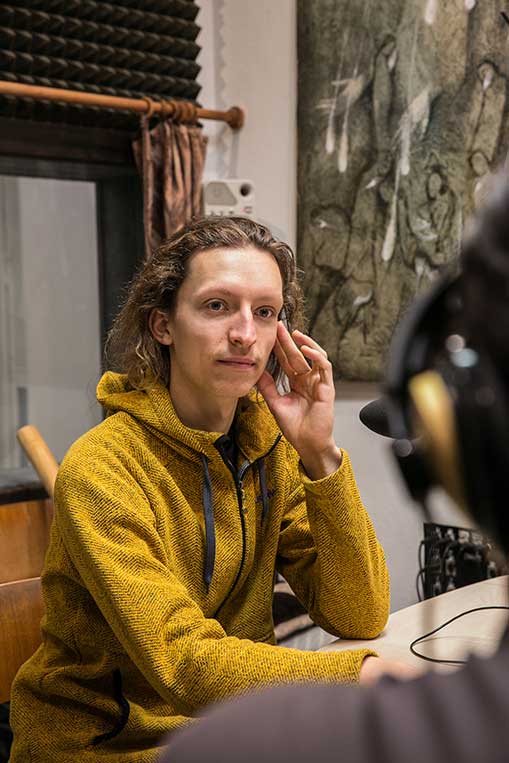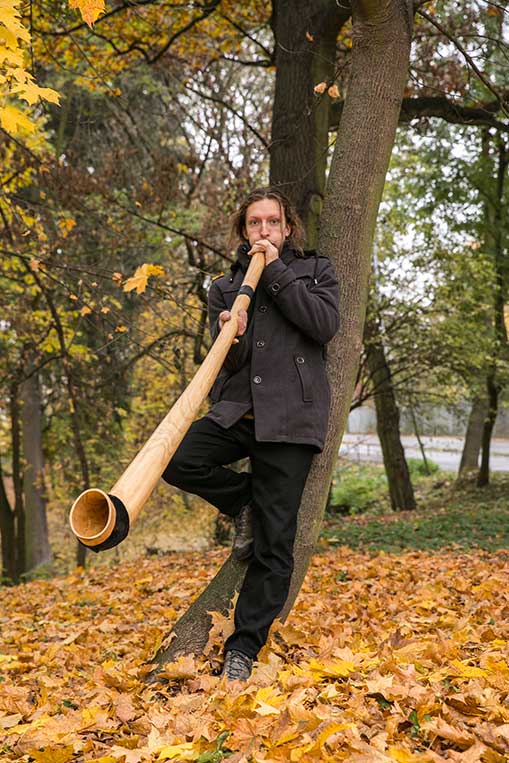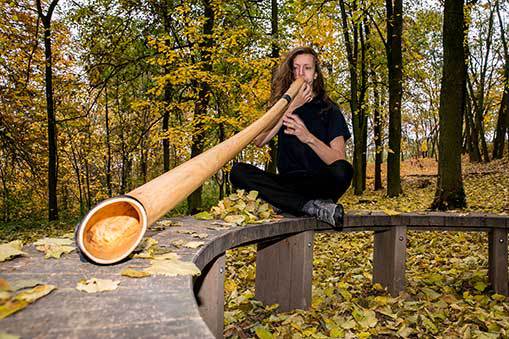Zenový čaj is not a band in the traditional sense of the word, but is a changing project in which anyone can participate at any appropriate moment. Half of the permanent members consist of the multi-instrumentalist and didgeridoo player Dalibor Neuwirt and the first album First Flush was made along with several famous musicians on the Czech scene.
Dalibor, under the name of Zenový čaj I only saw you performing some time ago. On the album First Flush two members are mentioned. What is Zenový čaj actually? Is it a one-man project? Is it a duo? Is it a band?
It is a band, which has its solid core. Initially only I was this core and later my friend Matouš Vinš joined me. Last summer we decided that we will make our first CD by inviting the best guests to the studio and that we will make the album directly at that place with them.
The roles of the guests Beata Bocek, violin player Jitka Šuranská or Ondřej Slavík the drummer of the Zrní band are really important on the album. But I assume that the songs were originally created by two people. How is your music actually made?
Our music is based on improvisation and it rests on the sound of instruments, which we have been playing for years. In my case they are the didgeridoo, aliquot flute and singing and Matouš plays saxophone, Irish flute and cajón. This base makes it possible to create purely instrumental music. In the free musical flow interesting motifs are created, which are developed further. A similar method was used to make the album First Flush. Joint improvisation generated certain motifs, we chose the best of them and those were further polished into final compositions.
 Both you as a didgeridoo player and Matouš as a saxophone player are working with your breath. Does this fact influence your cooperation?
Both you as a didgeridoo player and Matouš as a saxophone player are working with your breath. Does this fact influence your cooperation?
Yes it does, breath allows for specific combinations. The potential of two wind instruments can be nicely combined through vibrato, frulato and similar techniques as well as the use of the diaphragm.
However, the didgeridoo, unlike the saxophone and flute, cannot work with a wide tone range. Doesn’t it limit the cooperation?
It is a popular theme for my primary instrument, because the majority of didgeridoos are tuned only to one tone. Their capabilities are expanding due to various rhythmic techniques and overblow, which is a technique of trumpet playing. However, during the joint performance it is important that the musician who plays the didgeridoo adapts to this instrument and its fundamental tone. This requires certain methods of playing and rhythm perception, which is often a hard nut to crack. It is funny, because these musicians are accustomed to playing very complicated things and thus they cannot abandon the world of multi-tone harmony and enter the world of rhythm and develop the composition from the single tone. Due to all this music of a unique character is made.
 We mentioned the importance of improvisation in your music. When you play together with Matouš, who usually starts?
We mentioned the importance of improvisation in your music. When you play together with Matouš, who usually starts?
Mostly I start with the rhythmic pattern, which Matouš joins. But if we play meditation pieces of a calm character, Matouš starts with the flute and I gently and slowly join him.
Beside these meditation pieces your play is often very rhythmic; you even call it a “natural disco”. Are these pieces really intended primarily for dancing?
Yes they are, I perceive them as pieces for dancing. I take my pride in the fact that I play my music using primitive instruments with natural tuning and in a way that the music would invite one to dance.
You also say that your intention is to “actively share your abilities with others”. I presume that it does not concern only an ordinary relationship between a musician and his listener, or dancer, but it is the guidance of listeners to the fact they should experience the music with you and eventually that they should actively join you. Do you have any methods for this?
Certainly. I am glad, when interaction is part of the concert. I myself use communication in the rhythm – I play a stroke and encourage the audience to repeat it. Or I work with the voice. At the beginning we join together with the audience by singing a tone, and thus a unified full and rich chant is created, which provides the following solid and very pleasant support for the piece.
Among the guests on your album two members of the band Vlčí Mág can be found, which is your other musical activity besides Zenový čaj. Is it still active at this time?
Yes it is, I still perform with Vlčí Mág. In summer we had several concerts, we played in Polička as well as in Jablunkov at the Veetmaya festival, where we performed for the first time with Tom Byrtus playing drums. Now we are on a several months’ long hiatus, however, the joint production and performance still interests us.
Among the other guests on the album is also David Synák, the saxophone and flute player from Čankišou. Why did you invite him to the studio, when you have saxophone and flute in the basic arrangement?
It is simple. Our production is similar to Čankišou music and we liked David’s instrumental expression very much. Thus we thought that he can contribute to the diversity of our album, which actually did happen. He took a Ukrainian flute to the studio, which has a distinctive character, and he conjured up the perfect atmosphere for the composition Železná Bohyně.
Another guest is the beat boxer Sebastian Kunec. Beatbox, with its various techniques, complements well the didgeridoo playing, but it could also be perceived as competition to this instrument...
I perceive it as more of an addition. Both the “instruments” are very rhythmic and they cooperate like any other two percussion instruments. They just fill more space with their richness.
Your rhythmic pieces, with their character, are close to electronic music; however, you work mainly with acoustic sounds. Do you have no interest in electronic music?
Partly it interests me. It is a world, which I secretly research (smile). I plan pieces and maybe also an album in the future, in which I will use elements of electronic music. But rather than the intentional use of electronic music I am interested in the actual sound play, in its fullness and its bending of guitar effects, as well as the solid ones, typical for metal music.
You can use effects directly on stage, but they can be clearly used in studio while working on already recorded material. I know that your motto is to “set to music the current moment”. To what extent is it important to you to create music at a place in real time?
I rather prefer the current moment, thus the events occurring on stage or in streets. I try to polish the sound of things that originate there, to process them using a good technique for the final sound recording. I like working in a way that I collect the material in real time and I try to extract the maximum out of it without bending or changing it.
You mentioned playing in a street, which is a platform that directly calls for communication. Does it ever happen that people come to you and ask about the didgeridoo?
Of course this often happens; streets are typical for such interactions. People are interested about the didgeridoo and the things I do in the streets, which is often extravagant. They are interested in communicating with me.
Do you have any list of frequently asked questions?
One of the most frequent questions is about what instrument it is, what it is called and how it is played. Right after that there is a question about its price (laugh). Guess who asked these questions... Among other questions there is how it is possible that I play without a pause – people ask about cyclic breathing. And then there are questions about technical details and about my person.
I know that you are working on the guide Dech, hlas a alikvotní zpěv (Death, voice and aliquot singing). How is it progressing?
The lectures of this summer inspired me to write this book. For the first time in my life I experienced a moment, when I managed to lose the suppressed voice of Luděk, graduate of my lecture, into the position of vigour and sonority after several hours of work. It was a very strong experience for me, because together with the loosening of the voice he opened up to me as a person. After a series of similar experiences I was so full of enthusiasm and inspiration that I decided to write a methodology, which I composed over the last eight years. While writing this book I realized that the methodology may not only serve me as a synoptic list of techniques, but it can also be useful to everyone, not only to those, who graduated from my lectures. Thus I proceeded to write again. In three months I finished the book, which is one of a kind in our country, at least from the perspective of aliquot singing. I already finished it, now some proof reading remains and then the funding of the edition will be decided. Part of the guide will be published as an eBook for free, at the beginning of December it will appear on my website www.djlidu.cz?. The entire guide, as I hope, could be published on Christmas, but I won’t promise anything.
And if anyone would not want to wait for the guide and would like to meet you personally or at least listen to the album of Zenový čaj, what would you advise them?
At the turn of November and December I am organizing a Zpěv po Mongolsku workshop and the Didgeridoo and beatbox course in Brno. And people who would like to listen only to the album of Zenový čaj, can access it through our website.
































No comment added yet..